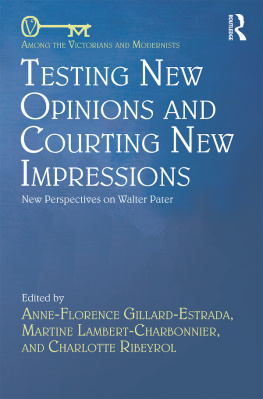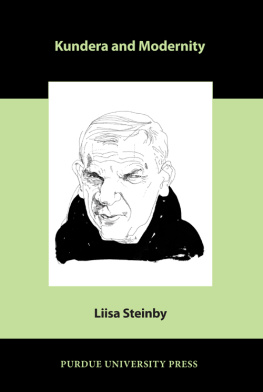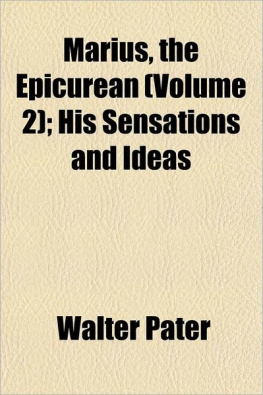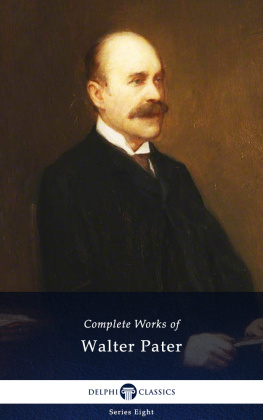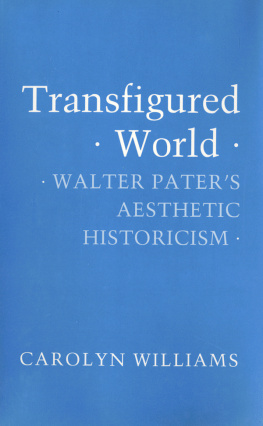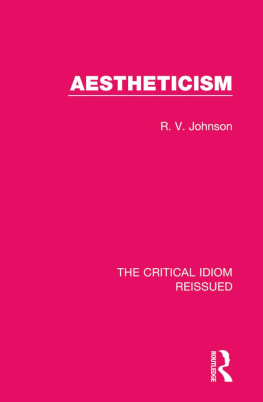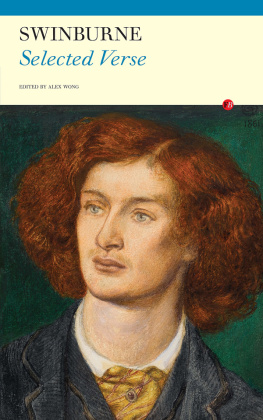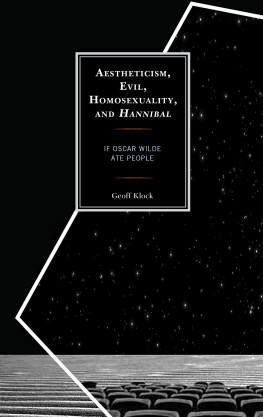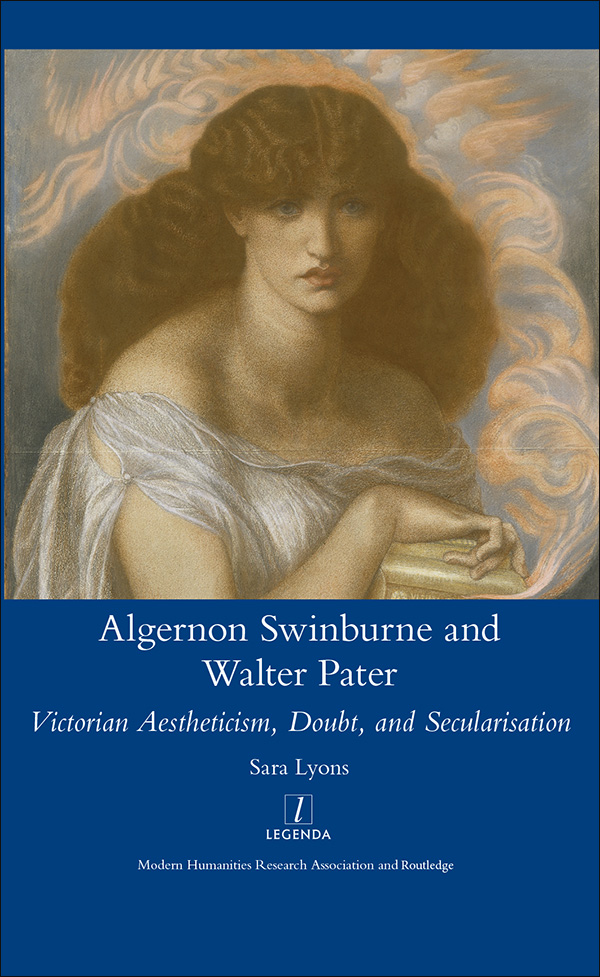Contents
ALGERNON SWINBURNE AND WALTER PATER VICTORIAN AESTHETICISM, DOUBT AND SECULARISATION
Algernon Swinburne and Walter Pater
Victorian Aestheticism, Doubt and Secularisation
SARA LYONS

First published 2015
Published by the
Modern Humanities Research Association and Routledge
2 Park Square, Milton Park, Abingdon, Oxon OX14 4RN
711 Third Avenue, New York, NY 10017, USA
LEGENDA is an imprint of the
Modern Humanities Research Association and Routledge
Routledge is an imprint of the Taylor & Francis Group, an informa business
Modern Humanities Research Association and Taylor & Francis 2015
ISBN 978-1-909662-48-3 (hbk)
All rights reserved. No part of this publication may be reproduced, stored in a retrieval system, or transmitted in any form or by any means, electronic, mechanical, including photocopying, recordings, fax or otherwise, without the prior written permission of the copyright owner and the publisher.
Product or corporate names may be trademarks or registered trademarks, and are used only for identification and explanation without intent to infringe.
Disclaimer: Statements of fact and opinion contained in this book are those of the author and not of the editors, Routledge, or the Modern Humanities Research Association. The publisher makes no representation, express or implied, in respect of the accuracy of the material in this book and cannot accept any legal responsibility or liability for any errors or omissions that may be made.
LEGENDA
LEGENDA, founded in 1995 by the European Humanities Research Centre of the University of Oxford, is now a joint imprint of the Modern Humanities Research Association and Routledge. Titles range from medieval texts to contemporary cinema and form a widely comparative view of the modern humanities, including works on Arabic, Catalan, english, French, German, Greek, Italian, Portuguese, Russian, Spanish, and Yiddish literature. An editorial Board of distinguished academic specialists works in collaboration with leading scholarly bodies such as the Society for French Studies, the British Comparative Literature Association and the Association of Hispanists of great Britain & Ireland.
MHRA
The Modern Humanities Research Association (MHRA) encourages and promotes advanced study and research in the field of the modern humanities, especially modern European languages and literature, including English, and also cinema. It also aims to break down the barriers between scholars working in different disciplines and to maintain the unity of humanistic scholarship in the face of increasing specialization. The Association fulfils this purpose primarily through the publication of journals, bibliographies, monographs and other aids to research.

Routledge is a global publisher of academic books, journals and online resources in the humanities and social sciences. Founded in 1836, it has published many of the greatest thinkers and scholars of the last hundred years, including Adorno, Einstein, Russell, Popper, Wittgenstein, Jung, Bohm, Hayek, McLuhan, Marcuse and Sartre. Today Routledge is one of the worlds leading academic publishers in the Humanities and Social Sciences. It publishes thousands of books and journals each year, serving scholars, instructors, and professional communities worldwide.
www.routledge.com
EDITORIAL BOARD
Chairman,
Professor Colin Davis, Royal Holloway, University of London
Professor Malcolm Cook, University of Exeter (French)
Professor Robin Fiddian, Wadham College, Oxford (Spanish)
Professor Anne Fuchs, University of Warwick (German)
Professor Paul Garner, University of Leeds (Spanish)
Professor Andrew Hadfield, University of Sussex (English) Professor Marian Hobson Jeanneret,
Queen Mary University of London (French)
Professor Catriona Kelly, New College, Oxford (Russian)
Professor Martin McLaughlin, Magdalen College, Oxford (Italian)
Professor Martin Maiden, Trinity College, Oxford (Linguistics)
Professor Peter Matthews, St Johns College, Cambridge (Linguistics)
Dr Stephen Parkinson, Linacre College, Oxford (Portuguese)
Professor Suzanne Raitt, William and Mary College, Virginia (English)
Professor Ritchie Robertson, The Queens College, Oxford (German)
Professor David Shepherd, Keele University (Russian)
Professor Michael Sheringham, All Souls College, Oxford (French)
Professor Alison Sinclair, Clare College, Cambridge (Spanish)
Professor David Treece, Kings College London (Portuguese)
Managing Editor
Dr Graham Nelson
41 Wellington Square, Oxford oxi 2JF, UK
www.legendabooks.com
At the time of publication, there are no complete modern editions of the work of Walter Pater or Algernon Charles Swinburne, though a complete edition of Paters works, and a substantial selected edition of those of Swinburne, is in progress under the auspices of Oxford University Press. In the case of Swinburnes poetry, I have referred primarily to The Poems of Algernon Charles Swinburne, 6 vols (London: Chatto & Windus, 1904), as representing the best currently available compromise between quality and completeness of edition. In the case of Paters writings, I have used modern scholarly editions wherever possible, and otherwise referred primarily to the original Macmillan editions. I have chosen to use Matthew Beaumonts 2010 Oxford University Press edition of Paters Studies in the History of the Renaissance, which reproduces the original 1873 text. It is this first edition, rather than the three subsequent versions that Pater edited and revised during his lifetime, which best enables us to grasp why the book generated controversy and came to be understood as a manifesto for aestheticism.
First, I am profoundly grateful to Catherine Maxwell, who has been all I could wish for in a mentor and a friend since this project began as a PhD thesis. I am also extremely grateful to Francis OGorman, whose support has meant a great deal; and to Ana Parejo-Vadillo and Nadia Valman, who have been very encouraging and who have asked probing questions at critical stages. I owe special thanks to Matthew Bradley, Mike Collins, Andrew Eastham, Ben Hickman, and Lisa Robertson, who kindly read all or part of the final draft and allayed anxieties at the eleventh hour.
This project would not have been possible without the generous assistance of a Westfield Trust scholarship from Queen Mary, University of London, and an Overseas Research Student Award, both of which are gratefully acknowledged. More recently, the sense of camaraderie in the School of English at the University of Kent has made many firsts feel less daunting. The list of colleagues I would like to thank is too long, but I particularly want to acknowledge Cathy Waters and Sarah Wood for their guidance and encouragement.
My multiple families Bowyer, Lyons, Moxham, and van Schaik have been invaluable sources of support, in most cases despite the tyranny of distance. I especially wish to thank Mark Bowyer, Jack Lyons, and Kate and Andre van Schaik. In addition, I want to thank Jenn Chenkin, Josh Edmonds, and Ben Levine for all their help and friendship.


